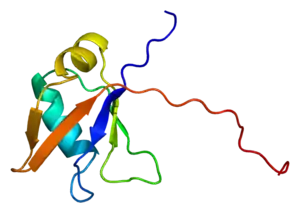Limbic-predominant age-related TDP-43 encephalopathy
Limbic-predominant age-related TDP-43 encephalopathy, is a proposed diagnosis for a form of dementia.[1] It is defined by a buildup of misfolded TDP-43 protein in the brain, especially the limbic system, typically in patients over 85 years. LATE is suspected to be present in about a quarter of people over 85, and is often comorbid with other forms of dementia, such as Alzheimer's disease. TDP-43 is also implicated in frontotemporal lobar degeneration and amyotrophic lateral sclerosis (ALS) diseases.[2] The brains of patients with LATE do not accumulate beta-amyloid or tau proteins as a regular dementia brain does. TDP-43 is responsible for the collections of proteins and proper functioning of genes in the cell, the misfolded TDP-43 results in the cell not getting the needed proteins to function properly. The onset of LATE is generally thought to be slower than other types of dementia.[2]
| Limbic-predominant age-related TDP-43 encephalopathy | |
|---|---|
| Other names | LATE |
 | |
| TDP-43 is encoded by the TARDBP gene | |
| Specialty | Neurology |
References
- Nelson, Peter T; Dickson, Dennis W; Trojanowski, John T; Boyle, Patricia A; Arfanakis, Konstantinos; Rademakers, Rosa; Alafuzoff, Irina; Attems, Johannes; Brayne, Carol; Coyle-Gilchrist, Ian T S; Chui, Helena C; Fardo, David W; Flanagan, Margaret E; Halliday, Glenda; Hokkanen, Suvi R K; Hunter, Sally; Jicha, Gregory A; Katsumata, Yuriko; Kawas, Claudia H; Keene, C Dirk; Kovacs, Gabor G; Kukull, Walter A; Levey, Allan I; Makkinejad, Nazanin; Montine, Thomas J; Murayama, Shigeo; Murray, Melissa E; Nag, Sukriti; Rissman, Robert A; Seeley, William W; Sperling, Reisa A; White III, Charles L; Yu, Lei; Schneider, Julie A (30 April 2019). "Limbic-predominant age-related TDP-43 encephalopathy (LATE): consensus working group report". Brain. Online first (6): 1503–1527. doi:10.1093/brain/awz099. PMC 6536849. PMID 31039256.
- "Newly recognised form of dementia could now be easier to diagnose". New Scientist. 30 April 2019. Retrieved 30 April 2019.
Further reading
- "Guidelines proposed for newly defined Alzheimer's-like brain disorder". National Institute on Aging. National Institute of Health. Retrieved 30 April 2019.